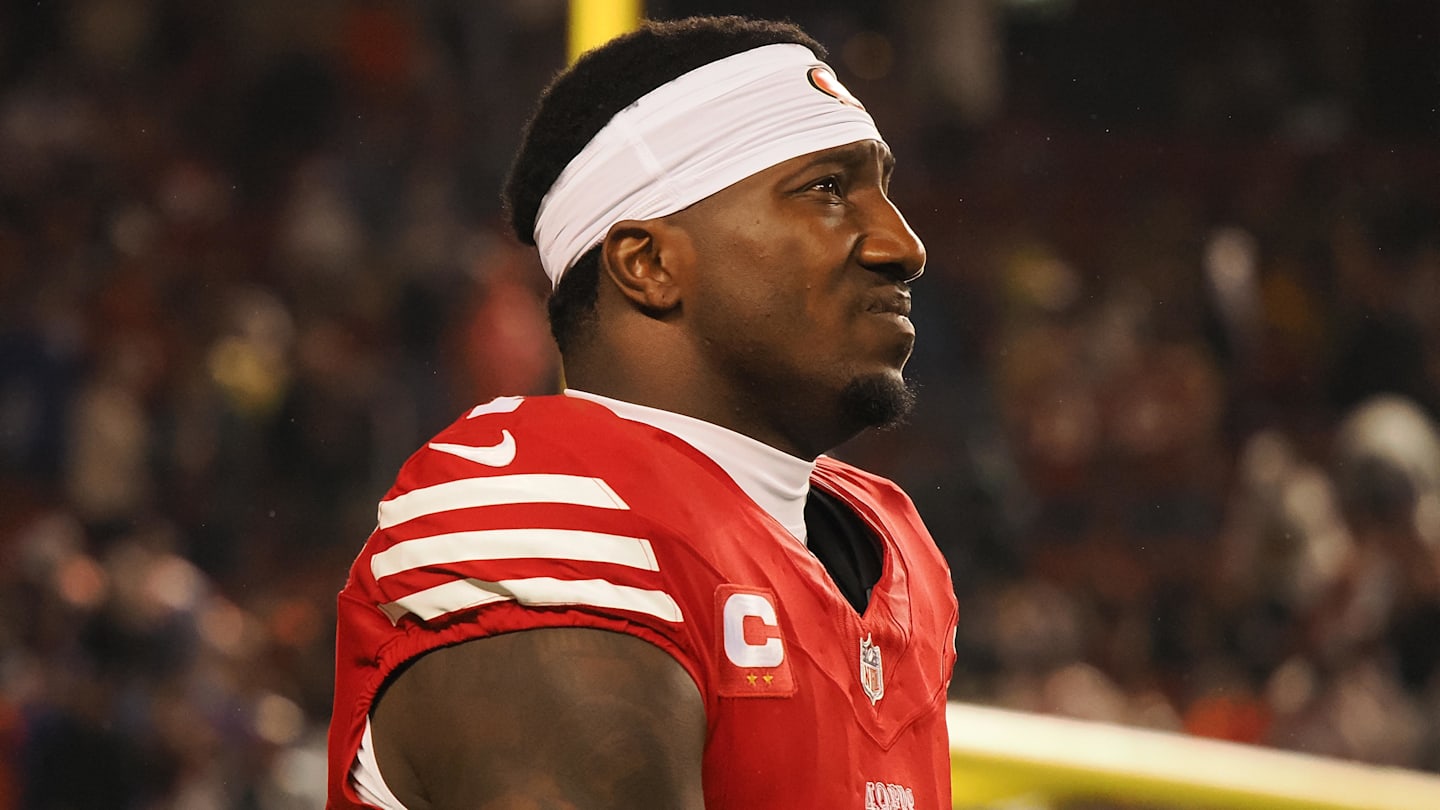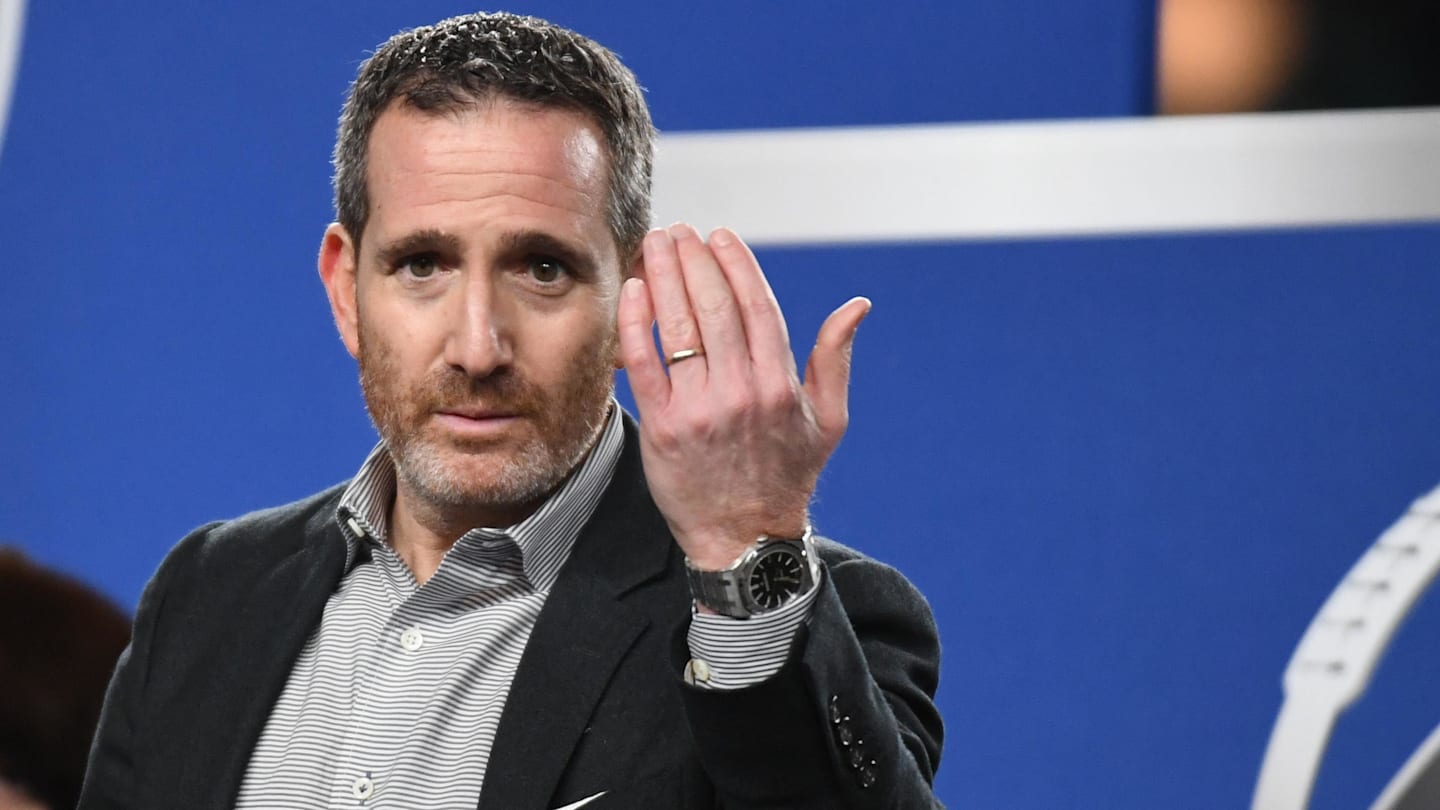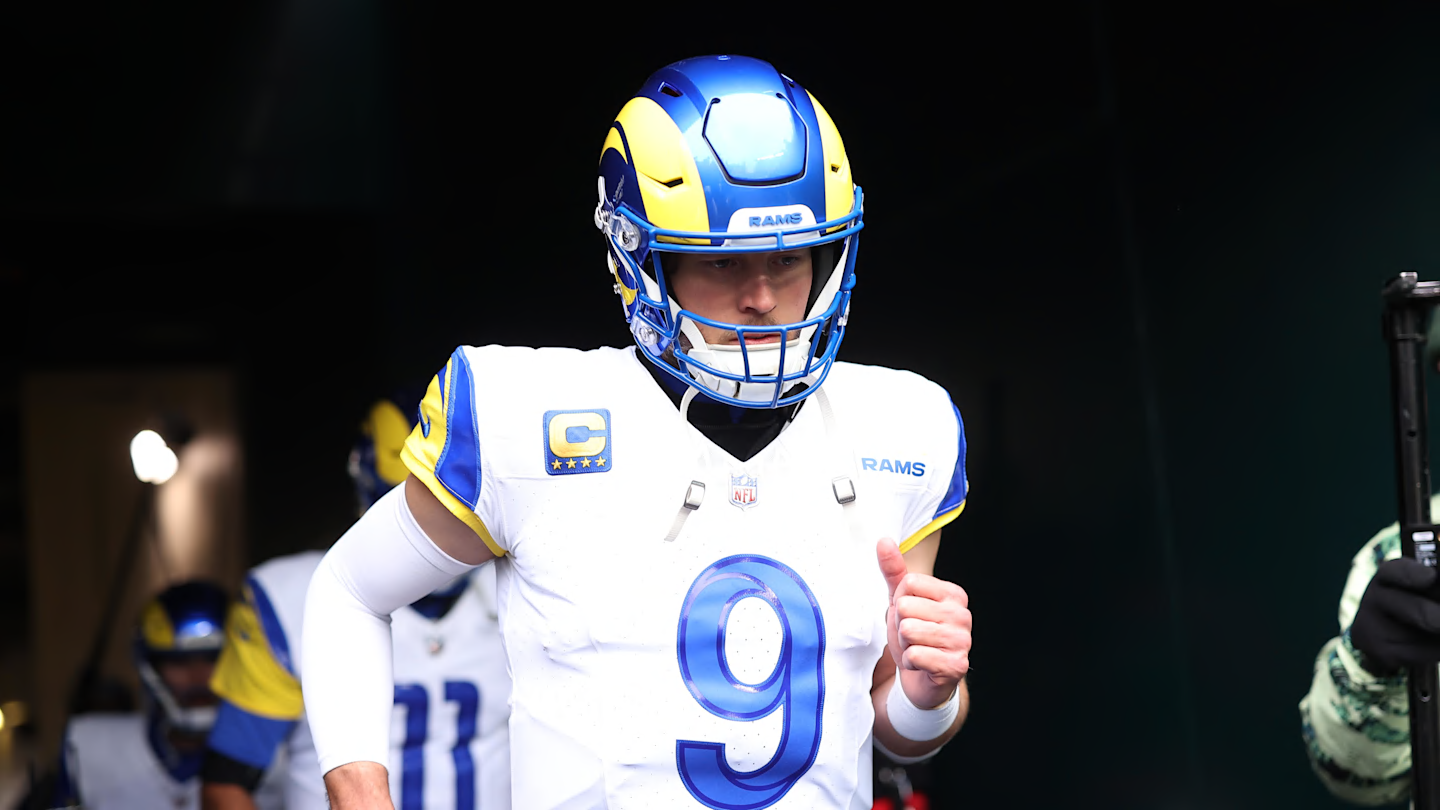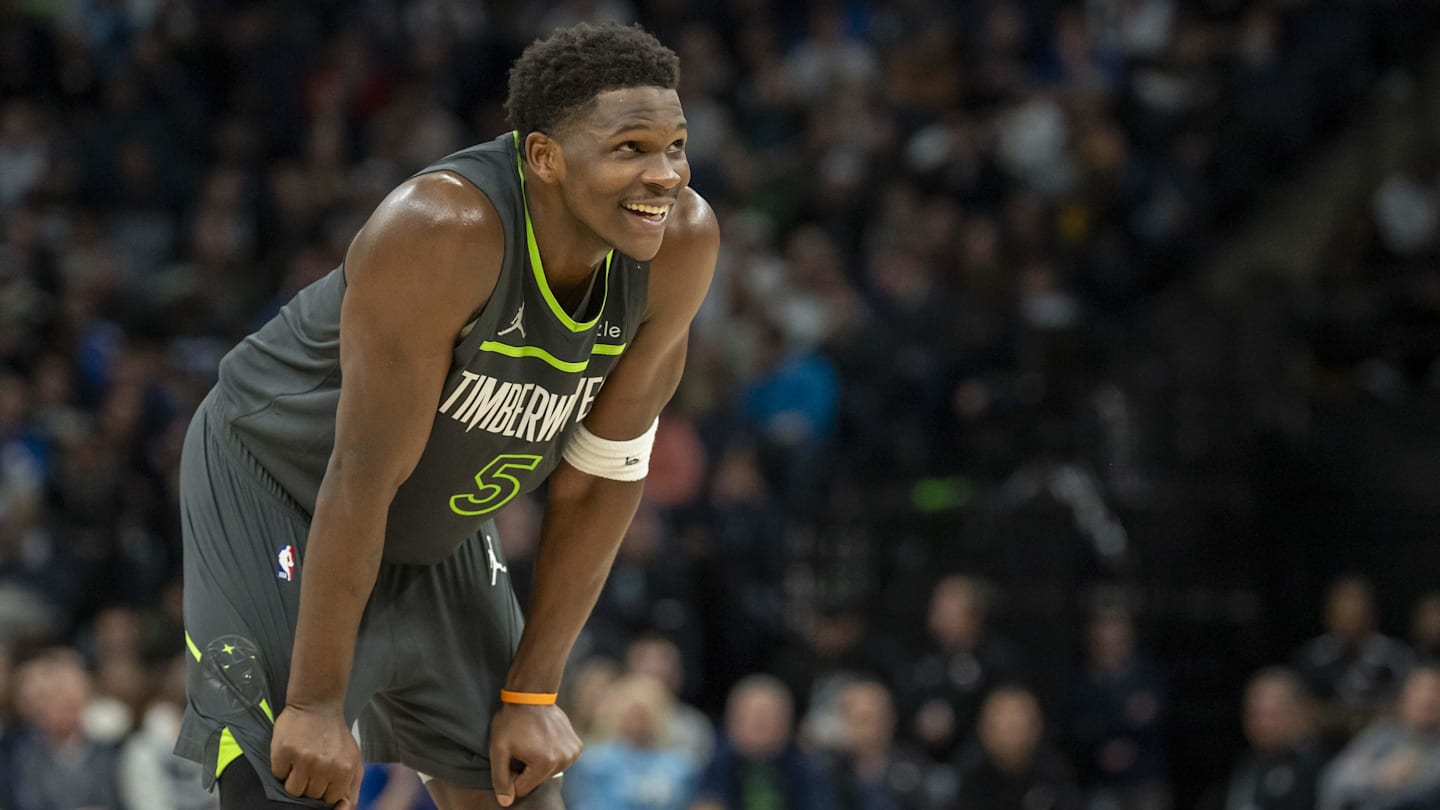Where can you attend five NFL training camps in one day? Only in Southern California
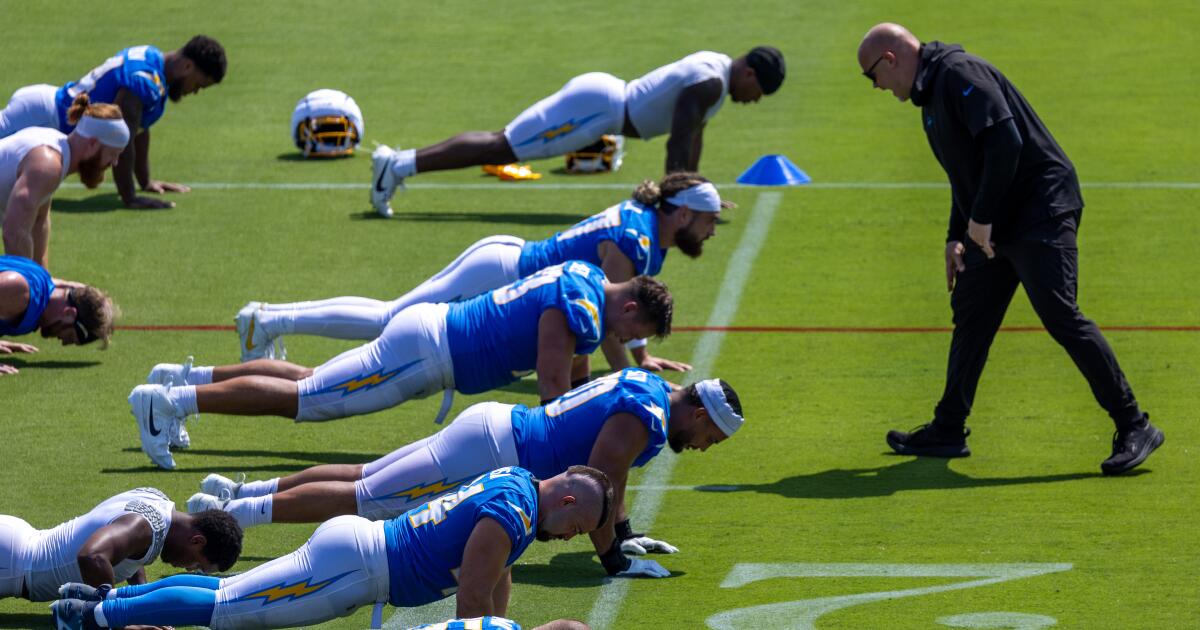
Location, location, location.
That’s what the Las Vegas Raiders and New Orleans Saints were thinking when they decided to move their training camps to Southern California, joining the Rams and Chargers and traditional summer transplant Dallas Cowboys, who have set up shop in Oxnard almost every summer since 2001.
The stretch between Ventura County to Orange County represents the densest cluster of teams in NFL history, even more concentrated than the so-called “Cheese League” in the mid-1990s, when five teams held camps in Wisconsin and the Vikings stayed in neighboring Minnesota.
Southern California almost had a sixth team this summer as the Houston Texans quietly looked into moving their camp to Thousand Oaks, where the Rams were holding their temporary headquarters ahead of the completion of the Woodland Hills site.
With that in mind, we set out to visit all five Southland camps in a single day, understanding that the drive was doable but we would need a Star Trek transporter to actually see every team at practice. We would be on the grounds of each camp but would wind up interviewing a lot of blocking sleds and tackling dummies.
Nonetheless, Los Angeles Times photographer Brian van der Brug and I mapped out our plan to drive from Oxnard (Cowboys) to “The Bolt” in El Segundo (Chargers) to Loyola Marymount (Rams) to Costa Mesa (Raiders) to UC Irvine (Saints). Five teams. An audacious nickel package, to be sure.
Those stops in that order span 121 miles, but we all know that could mean three months in bumper-to-bumper traffic.
“Everyone’s trying to get a piece of L.A. because of the weather. You can practice here. Think if you were in Louisiana right now.”
— Maurice Jones-Drew, former NFL and UCLA running back
There weren’t a lot of cars on the road when I left Dana Point at 4:45 a.m. in hopes of getting an early start at Cowboys camp a couple of hours later. Brian was coming from Thousand Oaks, so we decided to work our way down the coast from north to south.
I grabbed a quick breakfast along the way and, taking note of a Cowboys billboard near Oxnard, met Brian at the modest team hotel around 7:30. We drove separately to the camp, which wasn’t set to open until the following day. It was a beehive of activity, just no players or fans. Workers were unfurling banners that featured the faces of star players, and stocking the merchandise tents with jerseys, cups, miniature helmets and the like.
Cowboys merchandise is on display at the team’s training camp headquarters in Oxnard.
(Brian van der Brug / Los Angeles Times)
This is a second home to the Cowboys. They have their system firmly in place. It was a little more than decade ago, in a room of the neighboring hotel Jerry Jones had converted into his summer office, that the Cowboys owner indicated that the Rams could be coming back to Los Angeles.
Sitting behind his desk and pouring table salt on the rim of a beer can, Jones told me if Rams owner Stan Kroenke couldn’t work out a deal to stay in St. Louis — and such a deal was highly improbable — he was gone. Kroenke, Jones said, was one of the few people in the world with the cash, club and cajones to solve the L.A. stadium puzzle. As we now know, that’s precisely what happened.
We picked up our credentials and walked around the fields and checked out the bleachers, which will accommodate thousands of fans per day. Soon, we hit the road.
It’s 67 miles from Oxnard to El Segundo, but at that time in the morning — with freeways looking like ruby varicose veins on my phone — the glacial slog would take more than two hours. We got to “The Bolt” as new coach Jim Harbaugh and his Chargers were wrapping up practice.
We got a full tour of the lightning-bolt-shaped facility with team executive Fred Maas. Saw the equipment room that looked like a sporting-goods store, the digital imagery that allowed for meticulous measurements for perfect-fitting helmets and cleats, a team auditorium that would rival any IMAX theater, and a Wolfgang Puck kitchen that includes a pizza oven made to look like a giant Chargers helmet.
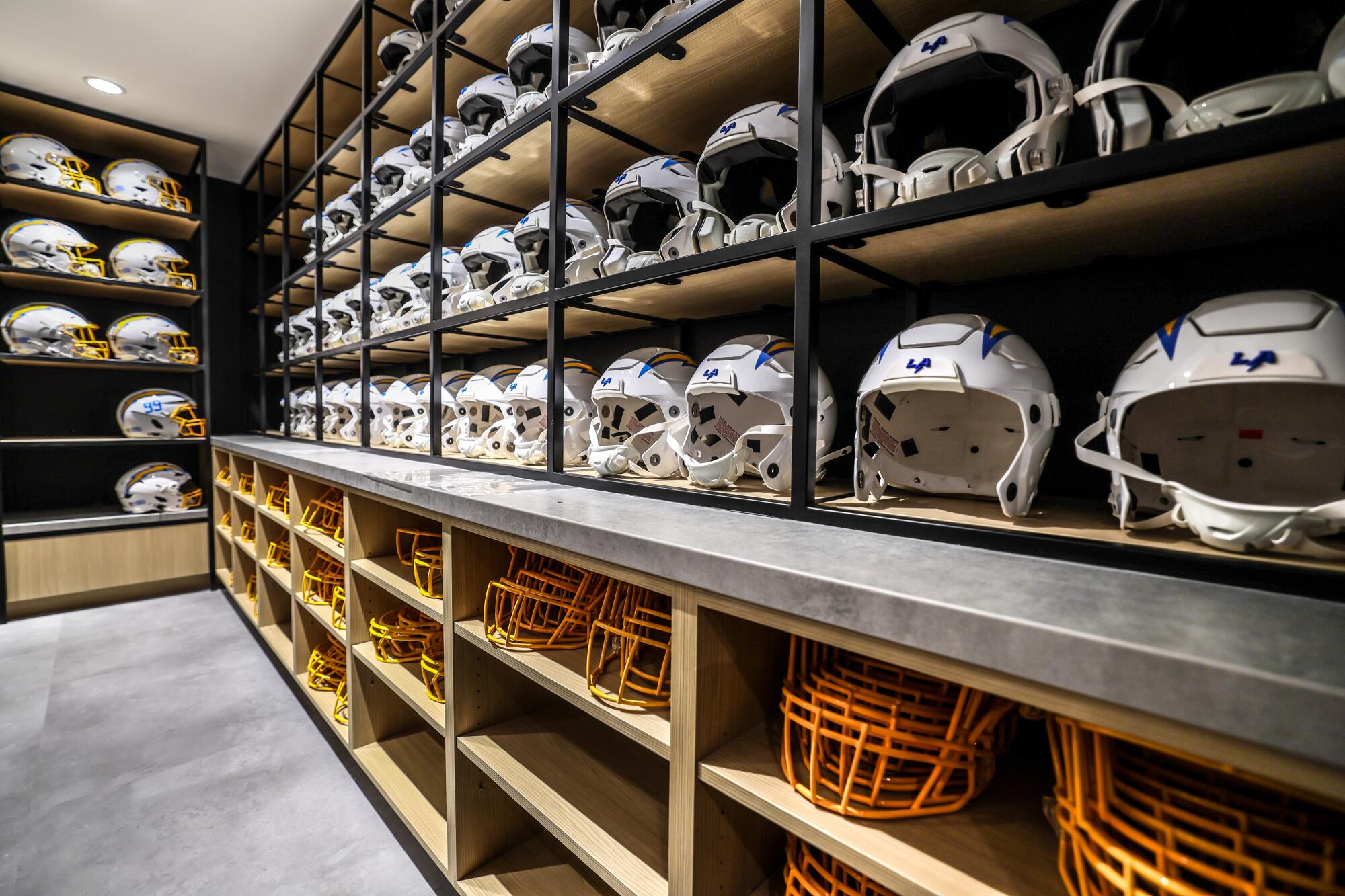
Dozens of helmet samples are in stock and ready for custom fittings of Chargers players at “The Bolt,” the newly constructed home of the Chargers.
(Robert Gauthier / Los Angeles Times)
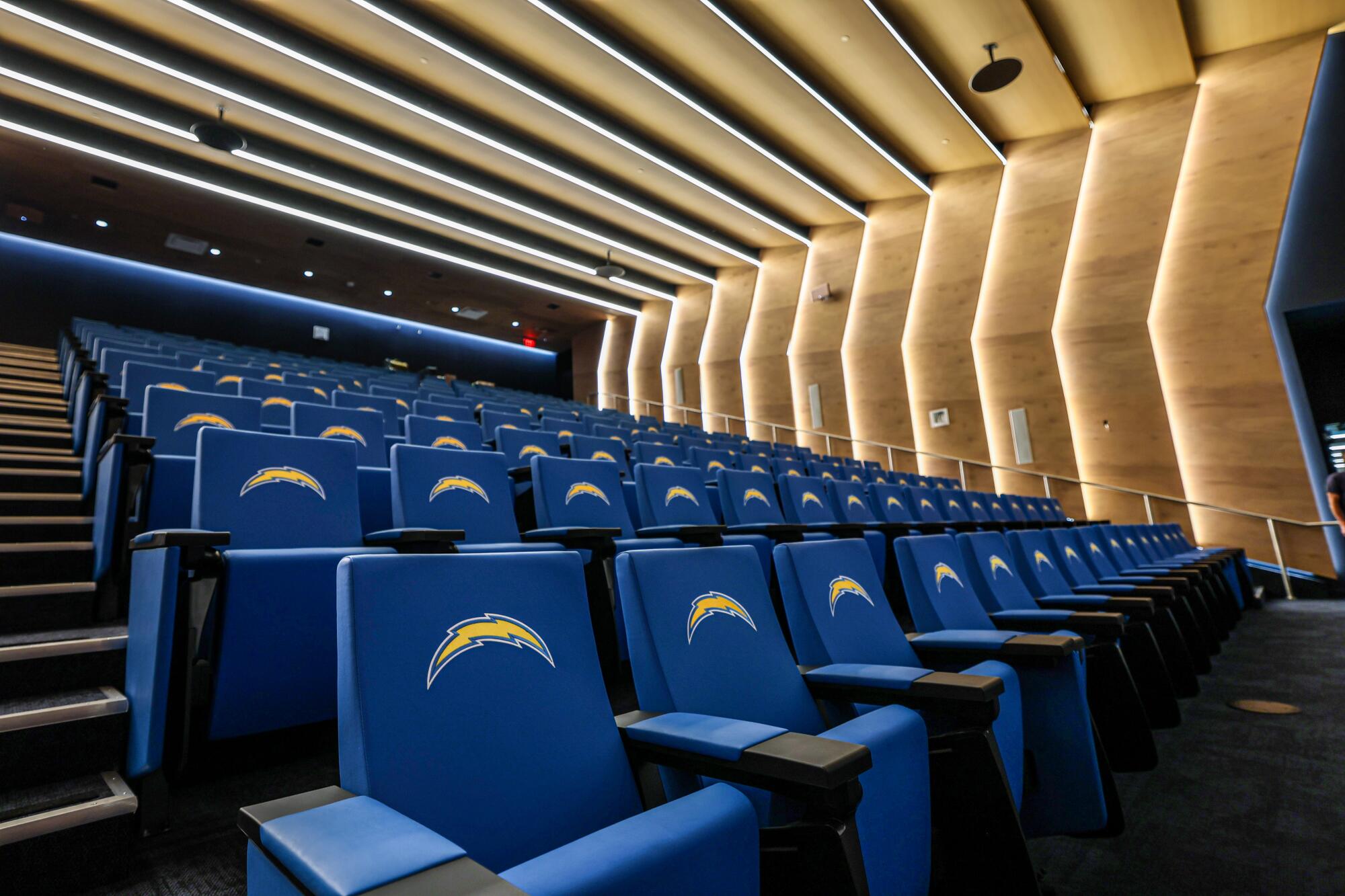
Dramatic angles of walls and lighting are featured in the team meeting hall at “The Bolt,” the newly constructed home of the Chargers.
(Robert Gauthier / Los Angeles Times)
The building features all sorts of glass walls and balconies overlooking the practice fields, and still under construction is a club where premium customers can sit at fire pits, order drinks and appetizers, and drop in to watch practice from a lofty perch.
The Cowboys set the standard for NFL practice facilities with “The Star,” a spectacular 91-acre campus in Frisco, Texas, that serves as team headquarters. Now many teams are following suit, among them the Rams, who are building a massive headquarters and entertainment complex on 100 acres in Woodland Hills.
The Bolt, which sits on 14 acres, provides the Chargers with three fields and a state-of-the-art facility, allowing the team to plant a flag in L.A. Standing on a balcony, you can see SoFi Stadium in the distance and, on a clear day, the Hollywood sign beyond that.
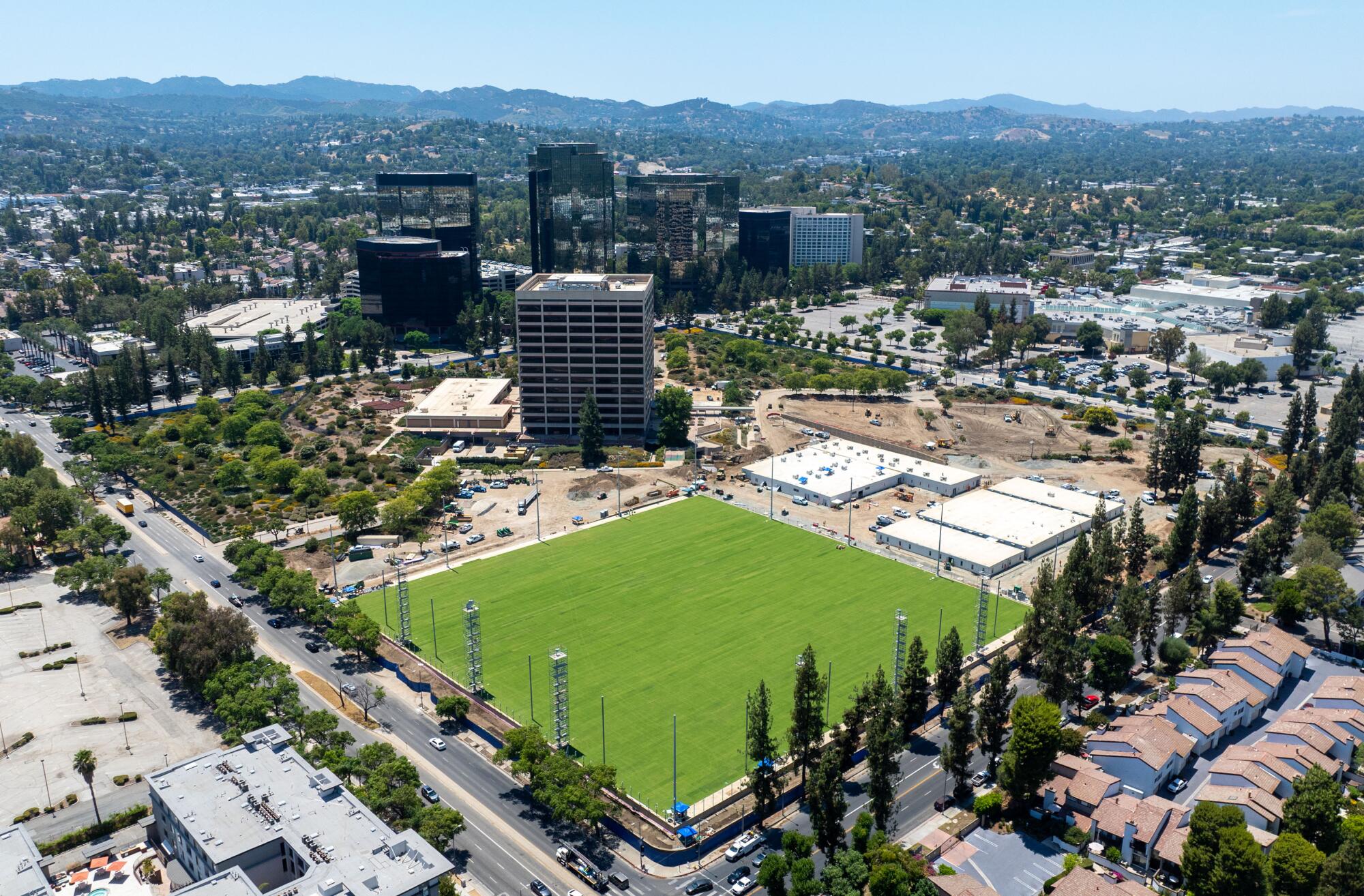
The grass is green on two practice fields at the new Rams training facility under construction in Woodland Hills.
(Brian van der Brug / Los Angeles Times)
After saying hello to Harbaugh, Brian and I made the 15-minute drive to LMU, temporary summer home to the Rams while their training facility is under construction. They wouldn’t be practicing until later in the day.
The Rams sacrificed space by moving north from their previous summer home at UC Irvine, but they wanted to be in L.A. and at a place with lodging, allowing players to walk from their rooms to the practice field. Practice time is limited by league rules, so Rams coach Sean McVay didn’t want to burn time on a bus shuttling players from their hotel to a facility, as in years past.
The setup is relatively small at LMU, with only one practice field. It’s lined with bleachers for fans, who sign up online to obtain free tickets. There are various fan areas and food trucks, and on this day, a gentle breeze coming off the ocean.
It’s a half-mile walk to camp for Maurice Jones-Drew, the former UCLA and NFL running back who’s now a color analyst for Rams radio. His main home is in the Bay Area but he has a condo near LMU. On this day, he walked up to camp to check out the new digs.
“Everyone’s trying to get a piece of L.A. because of the weather,” he said. “You can practice here. Think if you were in Louisiana right now. How do you practice out there? Being able to be in a nice, somewhat controlled environment, weather-wise, makes it so much better.”
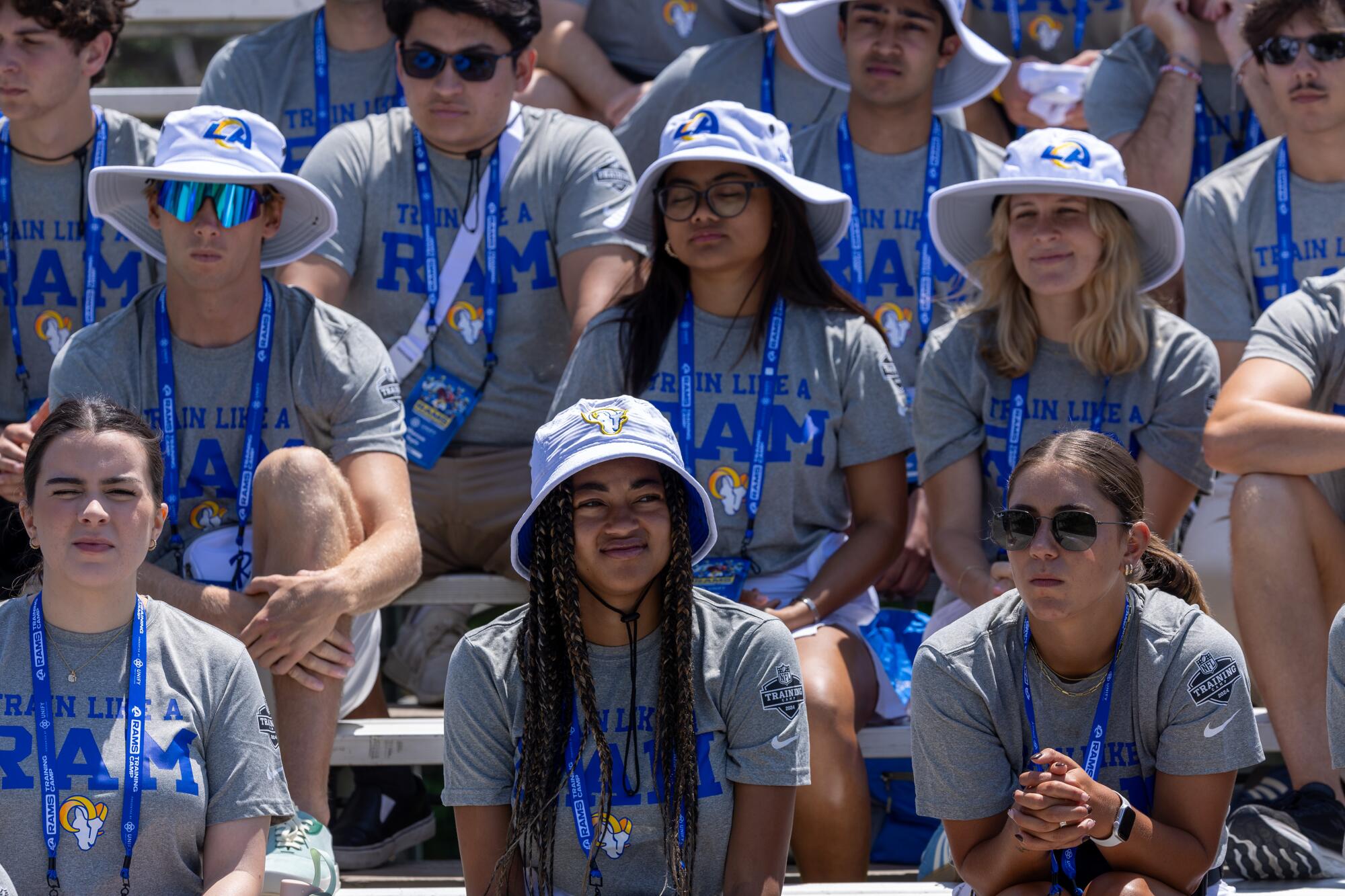
Weather conditions were favorable for players and viewers alike on the first day of Rams training camp at Loyola Marymount.
(Brian van der Brug / Los Angeles Times)
He knows. Jones-Drew spent much of his career in Jacksonville, where 90 degrees and 90% humidity were the norm for a summer day. He finished with the Raiders, though, and often wore a rubberized boxer sweatshirt so he could break an adequate sweat at training camp in Napa.
Three camps down, two to go.
Left LMU to make the hour drive south to Costa Mesa, where the Chargers held camp in previous years. They left for their new facility and the Raiders stepped in, looking to escape the Las Vegas heat.
Problem was, the Raiders didn’t inform the Rams or Chargers they were coming. Those teams each paid more than $600 million in relocation fees to the rest of the league for exclusive rights to the L.A. market.
Teams are largely free to hold training camps where they want, but what they can’t do is market themselves in the territory of another franchise. So initially, the Raiders and Costa Mesa had grand plans of open practices, fan appreciation events, youth clinics and the like. The NFL stepped in, however, and curtailed that.
So even though the Raiders are back in Southern California, someone could drive past the Jack Hammett Sports Complex and not notice they are there. There are a few silver-and-black signs and opaque fencing surrounding the 2½ football fields, but the footprint is discreet.
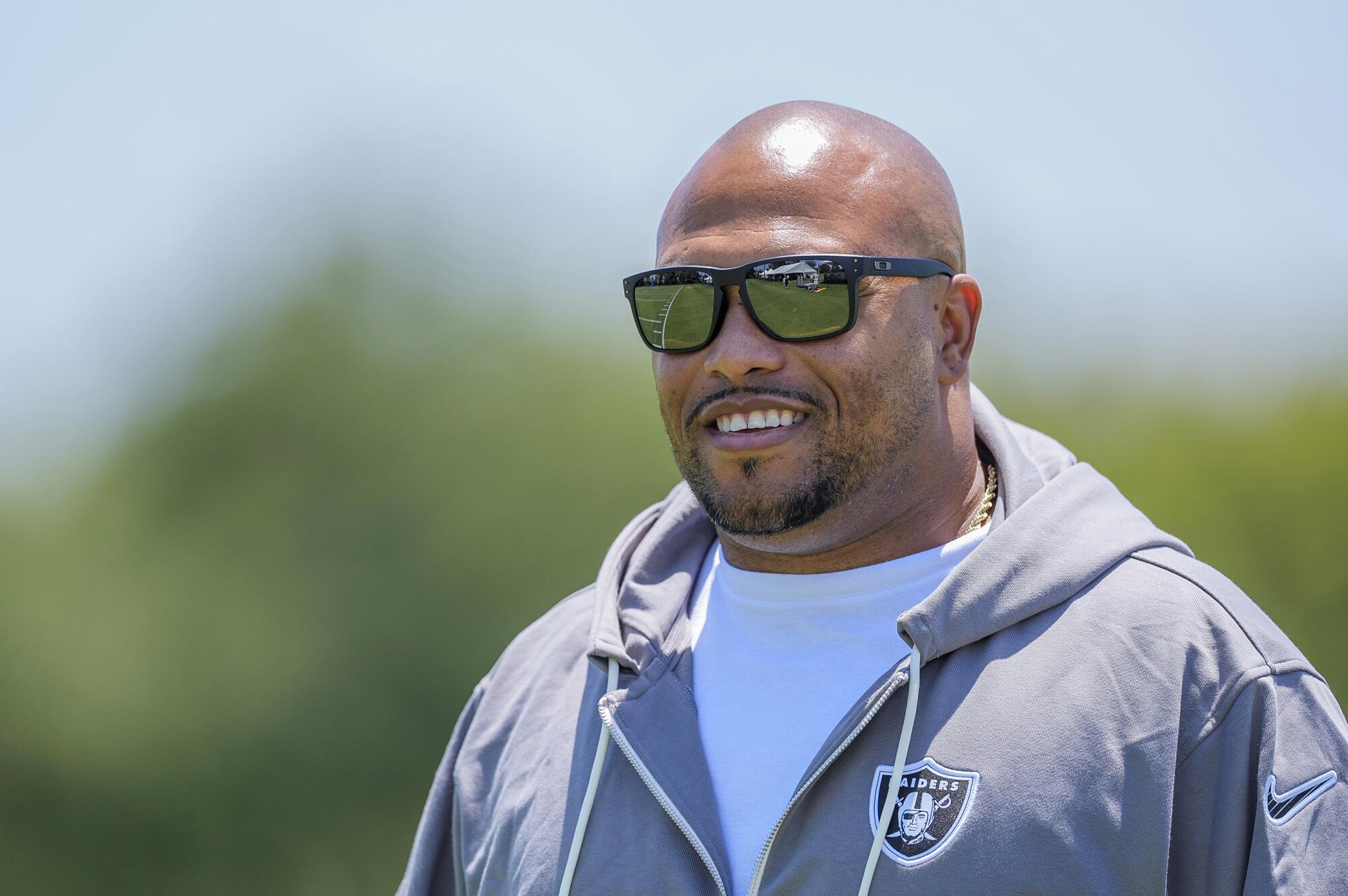
It is a homecoming for Raiders coach Antonio Pierce with training camp being held in Southern California.
(Damian Dovarganes / Associated Press)
There’s a tent for media and a few rows of bleachers, enough for the roughly 250 season-ticket holders invited to practice, along with the 100 or so friends and family members invited to camp. It’s a homecoming for new Raiders coach Antonio Pierce, who grew up in Long Beach.
The Cowboys can put up billboards and have thousands of fans at practices. They were grandfathered in, here long before the Rams and Chargers relocated to L.A.
Before Oxnard — which used to be the summer home to the Los Angeles Raiders — the Cowboys held training camp in Thousand Oaks. It’s one big game of musical chairs.
If the Raiders are low-key about camp, the Saints are downright stealthy. They’re in Irvine for only a year while their facility in Metairie, La., is getting upgraded. They gave the Rams and Chargers a heads up they were coming, and their camp is closed to fans.
There are guarded road blocks outside their fenced-in practice fields and small signs in Saints gold and black that read “Private Event.” If people not connected with the Saints need to cross through that part of campus, they’re told to walk briskly by and not take any photos.
Neither the Raiders nor Saints were practicing when we got there. We made brief visits and walked the fields, checking the boxes on our whirlwind tour. Access to a helicopter might have allowed us to see more actual football.
Back home that evening and unwinding from the day, I swapped texts with friend Mike Madden, son of the late John Madden, the Hall of Fame coach and broadcaster.
Five camps in one day.
“Somewhere,” he said, “my dad’s jealous.”
Related
Deebo Samuel Interested in Trade to Two NFL Teams Not…
Deebo Samuel would like to move on from his tenure with the San Francisco 49ers, but the trade market for the 29-year-old receiver doesn't appear to be lining u
One NFL GM Believes Eagles’ Howie Roseman Has Next Saquon…
Philadelphia Eagles general manager Howie Roseman made the move of the offseason last year when he brought in Saquon Barkley on a three-year deal. Barkley led t
Russini’s what I’m hearing: Garrett’s potential path to Philly, Stafford…
Bill Parcells had a famous piece of advice for NFL general managers and coaches regarding finding a quarterback: “Don’t go to the grocery store hungry.” R
Matthew Stafford to Reach A Major NFL Milestone in 2025
Los Angeles Rams quarterback Matthew Stafford is extremely likely to reach a major historic milestone in the NFL this season. Veteran quarterback Matthew Staffo
